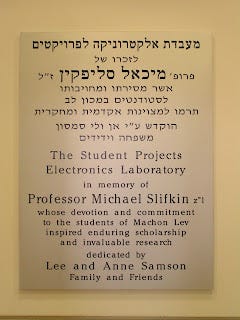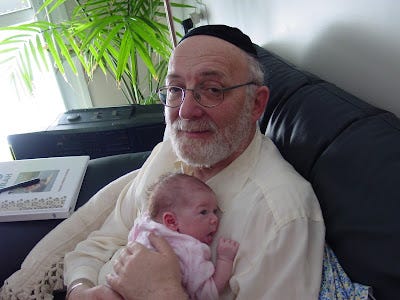Missing You, Dad

A treasured memory from nineteen years ago -
on a canoe with my dad, sipping from coconuts,
during a father-son trip to Mombasa, Kenya.
Yesterday, I was having a discussion with a friend about revisionism in Rambam. We were wondering what Rambam would have to say about it were he alive today. My friend asked me: "If you could choose any figure in Jewish history to come back to life, who would you choose?" Without even consciously formulating a response, I blurted out, "My Dad."
I had my father on my mind because today is his tenth yahrzeit. Professor Michael Slifkin, of blessed memory, was a wonderfully patient and good-natured father, a brilliant scientist, and a man of outstanding integrity. In a career spanning biochemistry, physics, electronics, membrane biology, and nanoparticles (amongst other things), he published 197 papers, including 11 in the prestigious journal Nature. He strongly believed in doing the right thing even if it made him unpopular, such as when he voted according to his conscience and not according to what was "the done thing" in England, or when he took on the position of safety officer for university labs and actually enforced safety regulations, much to the horror of his colleagues. He also had a terrific sense of humor!
Just like last year, due to a scheduling conflict with one of my sisters who is out of the country, a shiur that I am giving in his honor for family and friends is not being delivered on the actual date of his yahrzeit. In case you didn't read last year's post, I mentioned then how someone near and dear to me objected that since it's not being done on the actual date of the yahrzeit, "It won't have the proper effect for his neshamah!"

This is, I believe, a terrific example of the difference between the rationalist and mystical worldviews. According to the mystical worldview, our actions serve to manipulate various metaphysical energies. If they are not done in exactly the "right" way, then they don't have any effect. According to the rationalist worldview, on the other hand, our actions are not manipulating any metaphysical energies. The date of a person's passing is a meaningful and appropriate time to honor their memory. If it's done a day late, in order to better accommodate the family, that honors their memory more, not less.
This also relates to the fundamental nature of what one does for the deceased, a topic that I examined in detail upon the passing of my dear mother-in-law, Anne Samson, of blessed memory - see my essay, "What Can One Do For Someone Who Has Passed Away?" In brief, the mystical viewpoint, of very recent origin, is that one elevates the soul of the deceased by doing mitzvos whose reward is transferred to their mitzvah-account. The classical and rationalist view, on the other hand, is that by doing memorial events we honor their memory, and by performing good deeds we become a credit to their influence.
(As an update to that essay: I just came across something that seemed to raise a challenge to my thesis that there is no classical or medieval source for the notion that you can do a mitzvah to benefit someone who has passed away, unless you are their descendant or were otherwise influenced by them. Today I was looking at a contemporary sefer called Pnei Baruch which said that "Chazal say that Yaakov's son Asher sits at the entrance to Gehinnom and saves all those who learn Mishnayos, and even a stranger who learns Mishnayos on behalf of somebody saves him from Gehinnom." As I looked into it further, though, it became clear that the source in Chazal was only for the first part. The earliest source I could find for the second part was a sefer called Yalkut Das V'Din which was only published in 1945.)
Dad, I love you dearly, and I miss you more than ever. I'm sure you would understand why we are doing the shiur a day late. Because among the many good qualities that you taught me, one of them was common sense!



